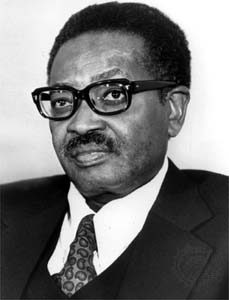Today, I wanted to read a poem by Hugo von Hofmannthal or Wisława Szymborska, but I couldn’t find (the time to make) a good translation of the German genius and I’m not fond of the Polish Nobel Prize winner. So I read a poet by former Angolan president Augustinho Neto (1922-1979) instead. Here it is, in a translation by W.S. Merwin:
Kinaxixi
I was glad to sit down
on a bench in Kinaxixi
at six o’clock of a hot evening
and just sit there …Someone would come maybe to sit beside me
And I would see the black faces
of the people going uptown
in no hurry
expressing absence in the
jumbled Kimbundu they conversed in.I would see the tired footsteps
of the servants whose fathers also were servants
looking for love here, glory there, wanting
something more than drunkenness in every
alcohol.Neither happiness nor hate.
After the sun had set
lights would be turned on and I
would wander off
thinking that our life after all is simple
too simple
for anyone who is tired and still has to walk.
Kinaxixi is a square in Luanda. Our author sits on a bench, with or without someo ne else sitting next to him. Happens every day, on thousands of squares around the world, especially in tropical or subtropical climate. The observer looks at the ‘black faces’. What does that mean in Angola, where almost everybody is considered black? Just when a nordic poem would talk about ‘white faces’, it implies the notion of paleness, black faces seem to stand here for absent-mindedness. Are they communters going back home to uptown? Kimbundu is “either of the Bantu languages of the Mbundu, often distinguished as Umbundu (related to Herero) and Kimbundu (related to Kikongo).”
ne else sitting next to him. Happens every day, on thousands of squares around the world, especially in tropical or subtropical climate. The observer looks at the ‘black faces’. What does that mean in Angola, where almost everybody is considered black? Just when a nordic poem would talk about ‘white faces’, it implies the notion of paleness, black faces seem to stand here for absent-mindedness. Are they communters going back home to uptown? Kimbundu is “either of the Bantu languages of the Mbundu, often distinguished as Umbundu (related to Herero) and Kimbundu (related to Kikongo).”
The people work hard, for generations already they were servants. But they aspire for more than just material comfort: Love and glory is what keeps them going, and it is said beautifully here in the phrase “something more than drunkenness in every / alcohol” (“além uma embriaguez em cada álcool!”)
When neither happiness nor hate, what is it they are looking for? The evening comes (early, we are not too far from the equator) and lights are turned on. “Our life” that is too simple, is that the life of the elite, whose fathers were never servants? And how do we understand the last line “para quem está cansado e precisa de marchar?” The man has spent hours on a bench on Kinaxixi square and then wanders off. It seems to me he doesn’t have to walk, like the people he had observed, and that’s why he thinks his life is too simple. Or he himself was tired, and he thinks is own life is too simple. It would be more complicated if he wouldn’t have to walk, if he wouldn’t experience the simplicity of a simple necessity, like the common people.
One thought on “Reading: Kinaxixi by Augostinho Neto”
Comments are closed.